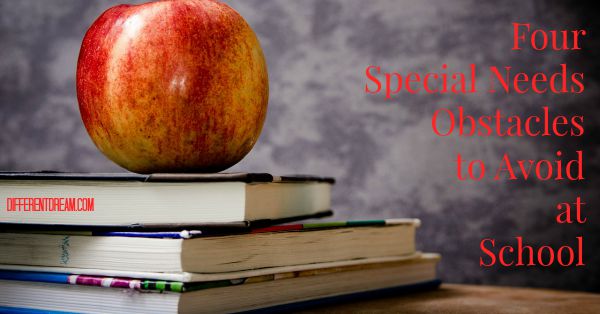4 Special Needs Obstacles to Avoid at School

With the school year drawing closer–and perhaps even underway in some parts of the country–Different Dream’s series designed to help parents become the best advocates they can be continues. The series is based on the content of a workshop held during the Access Summit last spring, Advocacy: Critical Conversations with Collaborative Outcomes. The workshop featured a blue ribbon panel of educators and parents: Ann Hines, principal at Rosa Lee Carter Elementary School; Barbara Tresness from the CHAT Collective; Linda Starnes, Parent Advocate; and Brendon Wolfe, principal of the S. John Davis Career Center. They shared many tips to help parents become effective IEP meeting advocate. Here’s what they had to say about how to avoid special needs obstacles before the school year begins.
Special Needs Obstacle #1: Unprepared Teachers
To avoid this obstacle, parents should ask administrators to put their child in a classroom with a teacher who welcomes kids with special needs. If the child uses communication devices or special technology, parents should also be proactive about training teachers and para-professionals about how to use it.
Special Needs Obstacle #2: Lack of Communication
To avoid lack of communication between parents and educators, parents should provide a communication journal. This is especially important for children who are non-verbal or have limited communication skills. The journal can go back and forth with specific information that assists parents and educators in working as a team.
Special Needs Obstacle #3: Ignorance about Advances in Assistive Technology
Educators can’t keep current about the constant advances in assistive technology devices. If a new device becomes available, parents should bring it in and show it to administrators. Explain how it helps the child and why it’s needed. This gives educators a chance to research and become familiar with what’s out there and with what might become part of a child’s IEP.
Special Needs Obstacle #4: Adversarial Relationships
Adversarial relationships between parents and educators can be a powerful obstacle. These relationships can spring from parental fear and anxiety, but can usually be traced back to a lack of communication. Both parents and educators need to do all they can to work as a team and only bring in professional advocates after all other avenues have been exhausted.
What Special Needs Obstacles Would You Add to the List?
What do you think of these 4 special needs obstacles? What would you add to the list? How have you overcome them in the past? Leave a comment.
Part One: 7 Ways to Advocate Before an IEP Meeting
Part Two: 4 Special Needs Obstacles to Avoid at School
Part Three: 10 Ways to Advocate at a Difficult IEP Meeting
Part Four: 3 Strategies for Good Communication after an IEP Meeting
Do you like what you see at DifferentDream.com? You can receive more great content by subscribing to the quarterly Different Dream newsletter and signing up for the daily RSS feed delivered to your email inbox. You can sign up for the first in the pop up box and the second at the bottom of this page.
By Jolene
Jolene Philo is the author of the Different Dream series for parents of kids with special needs. She speaks at parenting and special needs conferences around the country. She’s also the creator and host of the Different Dream website. Sharing Love Abundantly With Special Needs Families: The 5 Love Languages® for Parents Raising Children with Disabilities, which she co-authored with Dr. Gary Chapman, was released in August of 2019 and is available at local bookstores, their bookstore website, and at Amazon.
2 Comments
Submit a Comment
Subscribe for Updates from Jolene
Related Posts
A Little Boy, a Little Wheelchair, and a Big Lesson about Servanthood
Guest blogger Steve Harris explains his life with a little boy, a little wheelchair, and a big lesson in servanthood.
Whole in the Sight of God
Guest blogger and award-winning musician Steve Siler explains the roots of his song, “Whole in the Sight of God.”
Experiencing Post-Traumatic Growth while Raising a Child with Disabilities
Jolene explains the benefits of experiencing post-traumatic growth while raising a child with disabilities.






You are so welcome, Elise. But the real thanks go to the Accessibility Summit folks and the members of the panel who shared the great ideas relayed in the post.
What a perfect summary of the challenges parents and educators face at school each year. The beginning of the year can be so stressful, as parents, students, and teachers are all trying to get to know each other. I love your suggestion that parents be proactive in training teachers and developing the communication systems that will be most effective for them. Thanks for sharing!